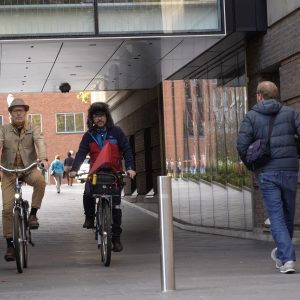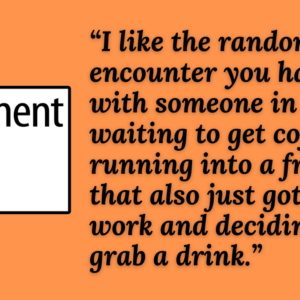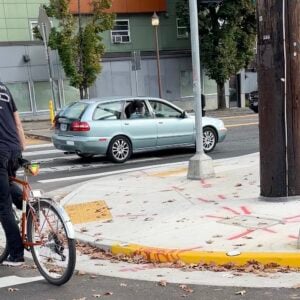
It was big news last week when the American Automobile Association (Triple A) announced they would begin offering roadside assistance to people on bicycles*.
Triple A is not the first company to offer such a service, but given their past of lobbying for automobiles (often at the expense of biking) the move struck me as highly symbolic.
“When huge companies like Triple A start treating bikes like they treat cars it’s pretty clear an emerging trend is now maturing.”
— Pat Dooris, KGW reporter
What struck me even more about this story was how a local TV station reported it. KGW, Portland’s NBC affiliate station, ran their story on Thursday. Check out how anchor Joe Donlon introduced the video report:
“When the American Automobile Association begins covering bicycles, you know we have reached a tipping point in the world of transportation… It probably shouldn’t surprise any of us that Portland and the Northwest are leading the way in, once again, recognizing the rise of the bicycles.”
And KGW reporter Pat Dooris:
“We’ve clearly seen an increase in bike traffic in the last few years and when huge companies like Triple A start treating bikes like they treat cars it’s pretty clear an emerging trend is now maturing.”
And here’s Marie Dodds with Triple A:
“As we all know, bicycling is becoming more and more popular, whether you do it for the economy, for the environment, or because you’re worried about your fitness — a lot of people enjoy riding their bicycles.”
And how about Mitch Rofsky with Better World Club:
“I think it says a lot…I don’t think there’s any question that bicycling is growing…”
That kind of coverage is an important component of Portland’s bike ecosystem. Positive messages about bicycles — especially when they are not coming from a city or advocacy group-sponsored program — are very powerful ways of changing behavior.
Once people outside the regular bike bubble feel like “everyone’s doing it,” they’ll be much more likely to give biking a try.
Watch the KGW video here.
*Yes, I realize Portland-based Better World Club has offered bike assistance for many years.







Thanks for reading.
BikePortland has served this community with independent community journalism since 2005. We rely on subscriptions from readers like you to survive. Your financial support is vital in keeping this valuable resource alive and well.
Please subscribe today to strengthen and expand our work.
Jonathan,
You’re my hero!
I wouldn’t say their anti-bike lobbying was in the past, they were coming out against things in Salem this year. I wish I thought this was more than just a publicity stunt. That said I agree with you that it was nice to see bikes on the news without the accompanying “VS CARS” tagline.
by omitting to mention Better World, the local television “news” story becomes simply a distribution point for a triple-A press release. the Auto Club is still active in lobbying against higher fuel efficiency standards, public transit, etc. also, this roadside bike assistance program is not available “bike only,” as it is through Better World, but only as a perq of your auto policy. the “tipping point” hype is simply how the television station spun the story and should not be uncritically echoed on your blog. be clear: this is an anti-bike lobbyist selling stuff.
The local coverage is super swell. AAA, not so much.
Wait … does that mean one day I am going to start paying insurance on bike?
The fact that other ‘AAA type’ corportions have this as a standard business practice (Canada, Netherlands, etc.) and that there are others in the US making money on it made it an easier thing to consider.
When I travel to the Netherlands and Belgium…it is not the local bike groups or cities that I usually buy my bike maps at but the Dutch autoclub (ANWB). They promote travel just as the AAA does but much more holistically.
It is a business service that has come full circle…for those of you who know your transport history…many AAA type organizations were founded by bicyclists to serve bicyclists pre-1900. The early bike AAA type groups even helped lobby for ‘good roads’ and provided assistance to the fledgling auto machines and their operators.
Now lets see if the US AAA takes the next step of advocating and providing advocacy for an effective child bicycle [and walking] skills training program (like the Canadian AAA has done since before 1999).
Aaktsuki (#5) – The real question is, at some point, will you be forced to pay insurance for the bike? If you have renter’s / homeowners insurance, you’re already paying for bike insurance, because it’s covered under that policy (at least, currently).
I’m skeptical of AAA’s new service and their real motivation. An earlier story mentioned that they won’t supply tires or tubes because they feel there are way too many different sizes of bicycle tires to deal with, which just goes to show how little they know about bicycles. There are only about 4 common tire sizes used for most road riding: 23c, 25c, 28c, and 32c, and more often than not a simple inner tube or patch is all you need and you can keep riding. A selection of a few of the most common tire sizes and spare tubes could practically fit in a shoe box, but this is too overwhelming for an AAA service vehicle? And since most of us already carry a tire patch kit and spare tube on rides of any significant length, what sort of scenario would you realistically expect to need AAA for?
Quentin…you’ve never broken a spoke or twp 40 miles from town….have you? cracked a frame during a climb?
had a crank arm sheer off? striped a threaded headset?
there are a multitude of ways that a bike can be rendered useless…..
Thanks for this article. I work for AAA’s national office and just want to congratulate AAA Oregon/Idaho for taking this step to meet their members’ needs. I’d also just like to clarify a few points made in the article and comments. AAA has supported mass transit/public transportation, clean air and recycling programs for years (get the details here: http://bit.ly/AAAenviro). AAA also promotes eco-tourism and the reduction of auto emissions. I know there is one motor club that uses environmental issues as a marketing ploy to get people to join, but AAA stands on its record of supporting safety issues for pedestrians, bicyclists and motorists. AAA also has a history of teaching bike and pedestrian safety to children and adults.
Some have questioned the cost. The extra amount that you pay for a Plus or Premium membership ($39 in OR/ID) offers a lot more than just the bicycle roadside assistance, including additional miles of free towing. Check with your club to find out what else is included, and see if it’s worth it for you. If you’re already a Plus or Premier member, then there is no extra cost. Thanks, again, for the article.